Mary Anne Yarde's Blog: The Coffee Pot Book Club , page 115
November 10, 2019
Join Historical Fiction author, Beryl Kingston as she takes a look back at Armistice Day #Armistice #WW1 #History @berylkingston
Armistice DayBy Beryl Kingston

During the war I spent sometime in London living with two distant - but very close and much loved - relations, their surname was Garnsworthy, her name was Minnie and his was Jesse but as a small child I had called them 'Dardy' because Garnsworthy was too tricky a name for my infant tongue and 'Dardy' stuck.
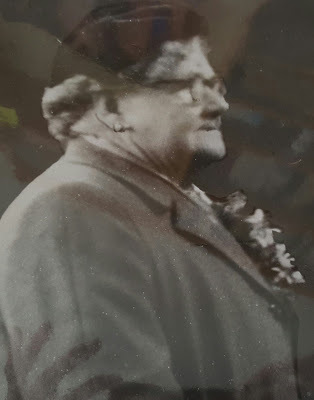 Dardy.
Dardy.They were both wonderful sources of stories. She told me what it was like to be sent out to work miles from home when she was twelve years old, he told me what it was like in the trenches. He needed a few pints inside him before he got going and Minnie was very worried about the things he was telling me, scolding him and saying 'she doesn't want to hear that Jesse!' but I did and I sat at his feet and lapped it up and afterwards wrote it all up in my diary.
He told me about the rats and the lice for a start, rats so big and bold they would bite a mans face when he was asleep and lice so prolific and omnipresent that the only way of dealing with them was to run a lighted candle on the seams of your uniform where they gathered and try to kill as many as you could. They called it 'chatting' and the word later changed its meaning and became sitting and talking together. How times change. But some of the worst things were unexpected.
He told me what the trenches smelt like, shit, blood, rotting flesh, cordite and gas and how absolutely filthy they were. Most of the time we were caked in mud.
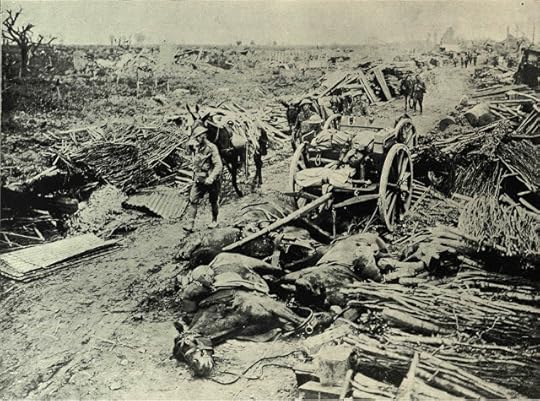
And he told me something I'd never heard before, they called it the 'Morning Hate' after they'd had their breakfast they were given a tot of rum and ordered to get up on the fire-step and when the word was given to fire into 'no-mans land' at random and as often as they could, it was a way of keeping up morale, they all got wildly excited and fired at dead horses to watch the rats run out of the corpses and then fired at the rats. I had never heard it spoken of or seen it written about anywhere else, but I knew it was true from the passion on his face and I put it almost verbatim into Everybody's Somebody.
So when people march past the Cenotaph with the brass bands playing and 'wear their poppies with pride' I just feel cynically angry. And when politicians say specious things like 'they died that we might live' I want to leap into the crowd and thump them.
So I'm ending this piece with two poems, because poetry is powerful and usually honest and Wilfred Owen who died in the First World War and wrote some of the most moving poetry I have ever read, is the first one I'm putting here. 'I am not concerned with poetry,' he said. 'My subject is War, and the pity of War. The poetry is in the pity... All a poet may do today, is warn.'
DULCE ET DECORUM EST
By Wilfred Owen
Bent double, like old beggars under sacks,
Knock-kneed, coughing like hags, we cursed through sludge,
Till on the haunting flares we turned our backs,
And towards our distant rest began to trudge.
Men marched asleep. Many had lost their boots,
But limped on, blood-shod. All went lame; all blind;
Drunk with fatigue; deaf even to the hoots
Of gas-shells dropping softly behind.
Gas! GAS! Quick, boys!—An ecstasy of fumbling
Fitting the clumsy helmets just in time,
But someone still was yelling out and stumbling
And flound’ring like a man in fire or lime.—
Dim through the misty panes and thick green light,
As under a green sea, I saw him drowning.
In all my dreams before my helpless sight,
He plunges at me, guttering, choking, drowning.
If in some smothering dreams, you too could pace
Behind the wagon that we flung him in,
And watch the white eyes writhing in his face,
His hanging face, like a devil’s sick of sin;
If you could hear, at every jolt, the blood
Come gargling from the froth-corrupted lungs,
Obscene as cancer, bitter as the cud
Of vile, incurable sores on innocent tongues,—
My friend, you would not tell with such high zest
To children ardent for some desperate glory,
The old Lie: Dulce et decorum est
Pro patria mori.
The second poem is mine and owes a very great deal to Jesse Garnsworthy and Wilfred Owen. Repec' gentlemen.
ARMISTICE DAY
Poppies that once bled pity in the Flanders fields
Are ritualised today to paper prettiness.
It’s the eleventh hour of the eleventh day of the eleventh month
The exact poetic time when the war that was to end all wars
That should never, in all conscience, have begun
Dragged its ravaged, shell-shocked, blood-soaked length
To a stunned stop
In the dumb, dead darkness of a corpse-gorged year.
Now it is men and rivers that are gorged
In the greed and thoughtless muddle of our time.
And only winter stirs long-hidden truth,
When furrows fill with water
Whitely reflecting an impassive sky.
Bare branches darken in a north-east wind
And the old cold shrinks a sullen earth,
Smites the caked hides of shivering cattle
Soon to be killed to feed our appetites.
And touches our too sentimental skin.
Yet Folly still stands proud with its paper flower,
To parrot out the politicians’ lie.
‘They died that we might live’.
Not so. Not so. Oh, it was never so.
They died like cattle, herded, scared and young
Because, like cattle, they were sent to die.
Beryl Kingston
I was born in 1931 in Tooting, and when I was four was enrolled at a local dancing school run by a lady called Madam Hadley, which I attended until I was eight when the war began. Because of the war my school career was – shall we say – varied. I was evacuated twice, the first time to Felpham which is near Bognor Regis and the second to Harpenden in Hertfordshire, and consequently went to ten different schools. I ended up at Streatham Secondary School, an LCC grammar run on the Dalton system, which offered a few lessons as sparking points and then required pupils to be responsible for their own learning, either in study rooms with their teachers on hand to help and advise, or on their own in the library or the school hall. It suited me to a T. Then to King’s College London, where I read English and enjoyed myself a lot, but wasn’t particularly distinguished, having other things on my mind by then...
Connect with Beryl: Website • Blog • Twitter • Books.
Published on November 10, 2019 20:00
November 8, 2019
#BookReview — Far Away Bird by Douglas A. Burton #HistoricalFiction #ByzantineEmpire @douglasaburton
 Far Away BirdBy Douglas A. Burton
Far Away BirdBy Douglas A. Burton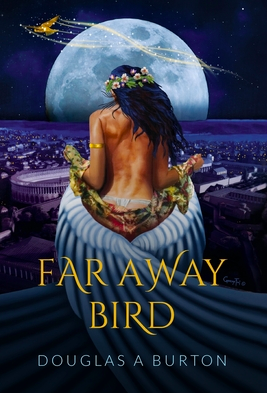
Inspired by true events, Far Away Bird delves into the complex mind of Byzantine Empress Theodora. This intimate account deftly follows her rise from actress-prostitute in Constantinople's red-light district to the throne of the Byzantine Empire.
Her salacious past has left historians blushing and uncomfortable. Tales of her shamelessness have survived for centuries, and yet her accomplishments as an empress are unparalleled. Theodora goes on to influence sweeping reforms that result in some of the first ever Western laws granting women freedom and protection. More than a millennium before the women's rights movement, Theodora, alone, took on the world's greatest superpower and succeeded. Far Away Bird goes where history classrooms fear to tread in hopes that Theodora can finally take her seat among the greatest women in history.
Theodora seems impossible--yet her transcendence teaches us that society can't tell us who we are deep down. Before there was a legendary empress, there was a conflicted young woman from the lower classes.
And her name was Theodora.

"So rapid the slide to destitution..."
So very rapid... Theodora would never forget the night her pata died. How foolish he had been. He should have stayed at home instead of joining the rebellion against the Emperor. If it had not been for Magister Origen then Theodora, her mother and two sisters would have ended up destitute.
Magister Origen had been so kind. So very thoughtful. He had even arranged for Theodora and her sister, Comito, to attend a dance school. This was not the time to look back and lament on all they had lost. The future, thanks to Magister Origen, was bright and promising.
However, underneath the painted faces and the gruelling dance lessons, there was another much darker world to the one that Theodora had been so excited to embrace. It would only be a matter of time before the real reason why Magister Origen had been so supportive, so diligent in his care, came to light. For Theodora, this terrible truth would change the course of her life forever...
From the dark days of rebellion to the awakening and cleansing of the spirit in His High Holiness, the Patriarch, Pope Timothy the Third's private chamber. Far Away Bird by Douglas A. Burton is the unforgettable story about the early and very humble life of the most influential and powerful of the Eastern Roman empresses — Theodora.
Far Away Bird is astoundingly ambitious, for Theodora's life is surrounded by historical controversy. She was a nobody, a notorious prostitute — a woman without morals or shame who somehow stole the heart of a man who would one day become an Emperor (Justinian I). Burton has taken this controversy and with a keen novelist eye for human fragility has penned a story that is not only tautly gripping but one that is utterly irresistible and impossible to put down. This book is, in all ways, an absolute triumph.
We meet Theodora as a child whose life is turned upside down by the death of her pata. Through Theodora's eyes, we watch as her life spirals out of control. The men who she meets, the things that she sees, the life that she seems to have no choice but to embrace has been diligently narrated. At times this makes for difficult reading — things happen to Theodora that is despicable, and disgusting, and vile. She is used, abused, and her spirit is crushed. Theodora becomes what these men wanted her to be. But Burton is the ideal commentator for Theodora’s tale. He takes this woman and the events that so marred her life and has given us this wonderfully brave protagonist who somehow finds the strength to claw her way out of a world of drunkenness, brothels, and promiscuity. Burton shows his readers the kind of woman Theodora was destined to become.
Theodora struggles greatly in this book, not only physically, but mentally as well. By the time this chapter, of what promises to be a rather wonderful series, closes, Theodora is only in her early twenties. So much happens to her that sometimes I found myself forgetting just how young she was. Theodora is a woman in an era where there were no women's rights, which Burton clearly demonstrates in this book. Once a fallen woman, it seemed nigh on impossible to leave that life. This is a desperate story, but the impressive narrative kept me turning those pages.
Theodora is an incredible protagonist who wears many masks to get through yet another day. Above everything else, this book is about a woman finding her way back to who she really is.
Although the world that Theodora inhabits is a bleak one, there is one shining beacon of light. From the moment he saved her family in the Hippodrome, Theodora has been in love, although she does not recognise the feeling, with Justinian. In a world where corruption and politics walk hand in hand, and everything wants something for nothing, Justinian is a breath of fresh air. Their feelings, once recognised, cannot be denied. He loves as fiercely as she does, and I am looking forward to reading more about Justinian in the upcoming books.
We meet many historical figures as the story progresses, but for me, the most memorable after Theodora is His High Holiness, the Patriarch, Pope Timothy the Third. His portrayal was absolutely sublime. Pope Timothy is a secondary character and is part of Theodora’s journey only very briefly. However, how he reacts to Theodora demonstrates how even for those who have fallen into a life of immorality, there is always hope for a better future.
Burton stays close to the historical events of this time — the politics as well as the people that grace the pages of this remarkable novel. I must commend the historical detailing in this book. Burton has brought, not only 5th Century Constantinople back to life but also the city of Alexandria. Burton has diligently explored the poverty, the deprivation, and the desperation of those whose life revolved around the brothels, theatre, and the hippodrome. Nothing is beyond the telling. Likewise, Burton gives his readers a real understanding of time and place, and he embraces all the senses to do this. The taste, the smell, the sights of Constantinople and Alexandria have been diligently weaved into this riveting tale. I lost track of time while I read this book, and also place. I was in Constantinople with Theodora. I could see it, taste it, smell it. I felt like I was witnessing the events rather than reading about them. Far Away Bird reads like a portal through time.
Far Away Bird is a monumental work of scholarship. Burton writes with tremendous grace and authority, but above else, he has an intuitive understanding of what makes history worth reading. I cannot wait to read book two of what promises to be a shamelessly compelling series.
I Highly Recommend.
Review by Mary Anne Yarde.The Coffee Pot Book Club.
*Pre-order your copy ofFly Away BirdAmazon UK • Amazon US*This title will be released on February 6, 2020.
Douglas A. Burton
 Douglas Alan Burton is a speaker, author, and expert storyteller whose work depicts heroic figures and their deeper connection to the human experience. Doug blogs about heroes, heroines, and villains in pop culture with some unexpected and refreshing perspective. He grew up in what he describes as “the heroic boyhood culture of late Generation X” that has gone mainstream around the world. He also shares strategies with fellow writers for writing compelling heroic characters in fiction.
Douglas Alan Burton is a speaker, author, and expert storyteller whose work depicts heroic figures and their deeper connection to the human experience. Doug blogs about heroes, heroines, and villains in pop culture with some unexpected and refreshing perspective. He grew up in what he describes as “the heroic boyhood culture of late Generation X” that has gone mainstream around the world. He also shares strategies with fellow writers for writing compelling heroic characters in fiction.Douglas recently began outlining a breakthrough storytelling model that reveals a fascinating “heroine-centric” model for story structure he calls The Heroine’s Labyrinth. He believes a powerful new archetype is emerging for women in fiction. His forthcoming novel, Far Away Bird, which centers on the early life of Byzantine Empress Theodora, won the 2019 Manuscript Content for Historical Fiction from the Writers’ League of Texas.
Connect with Douglas: Website • Blog • Twitter.
Published on November 08, 2019 20:30
#BookReview — A Necessary Killing (William Constable Spy Thriller Series, Book 2) by Paul Walker #HistoricalFiction #Thriller #Tudor @PWalkerauthor
 A Necessary Killing (William Constable Spy Thriller Series, Book 2)By Paul Walker
A Necessary Killing (William Constable Spy Thriller Series, Book 2)By Paul Walker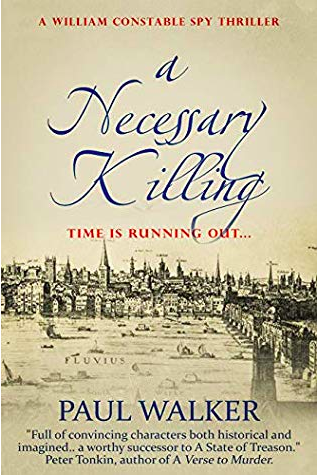 1579.William Constable - physician and unwilling spy - is in Plymouth waiting to sail to the New World. The expedition, led by renowned explorers and traders, John Hawkins and Sir Humphrey Gilbert, has already suffered birth pangs.William's friend, Captain Charles Wicken, is accused of killing the son of a wealthy merchant, but the testimonies appear suspect. When William learns that Wicken is one of Walsingham’s agents he uncovers evidence to suggest the murder and Wicken’s naming are designed to conceal a plot of invasion - backed by Rome and Spain.The sailing of the expedition's fleet is delayed while this threat is examined. William is despatched to St Malo, the lawless haunt of corsairs, to investigate. His betrothed, Helen Morton, together with the fleet, wait for his return.Malign forces conspire to prevent William from carrying vital intelligence back to Plymouth.William must evade enemy agents and unravel a tangle of duplicity if he is to survive - and prevent the invasion.
1579.William Constable - physician and unwilling spy - is in Plymouth waiting to sail to the New World. The expedition, led by renowned explorers and traders, John Hawkins and Sir Humphrey Gilbert, has already suffered birth pangs.William's friend, Captain Charles Wicken, is accused of killing the son of a wealthy merchant, but the testimonies appear suspect. When William learns that Wicken is one of Walsingham’s agents he uncovers evidence to suggest the murder and Wicken’s naming are designed to conceal a plot of invasion - backed by Rome and Spain.The sailing of the expedition's fleet is delayed while this threat is examined. William is despatched to St Malo, the lawless haunt of corsairs, to investigate. His betrothed, Helen Morton, together with the fleet, wait for his return.Malign forces conspire to prevent William from carrying vital intelligence back to Plymouth.William must evade enemy agents and unravel a tangle of duplicity if he is to survive - and prevent the invasion.
"Gentlemen, a plot, more devious and broader in scope than we suspected, has been uncovered..."
William Constable is a scholar of astrology and physics, he is not an adventurer, a sailor, or a soldier, but here he is in Plymouth, waiting to sail to the New World. It will be William's new instrument of navigation — The Shadow-Staff — that the fleet will be using. But since a storm ravaged the fleet during the passage from Sandwich, this grand adventure has been plagued with one delay after another. And the longer they remain in Plymouth, the more likely it is that the sailors will grow increasingly unruly due to idleness. However, there is an even darker threat than a crew of impatient and bored sailors.
William, unbeknown to most, is also a somewhat reluctant spy for Sir Francis Walsingham, spymaster and the principle Secretary to Queen Elizabeth I. But, William isn't the only one. His dear friend Captain Charles Wicken also works for Walsington and Wicken has uncovered a plot in which it seems that Spain and Papist Rome back an invasion of England.
William must discover if the plot has substance and, until he does, the grand adventure will have to wait.
From attempted murder to a daring escape, A Necessary Killing (William Constable Spy Thriller series Book 2) is the exciting new thriller by Historical Fiction author, Paul Walker.
Having been entirely captivated by Walker's debut novel, State of Treason, I was looking forward with eager anticipation to reading the second book, in what promised to be a fabulous series. A Necessary Killing was everything I had hoped it to be and then some.
As before with Book 1, William captured my attention from the very first sentence and Walker's compelling narrative seduced me and enticed me to keep turning those pages. The story is incredibly fast-paced with a whodunnit? mentality that made this book next to impossible to put down. This novel certainly has enough adrenaline to keep you up all night. A Necessary Killing does not threaten to mesmerise — it does.
In book 1, William is a somewhat reluctant spy for Spymaster Walsingham, and on the face of it, he isn't the obvious choice. William isn't a soldier, but perhaps that is what makes him so good at being a spy. He is out of his depth on more than one occasion, and yet, somehow, he gets results that others do not, and maybe that is down to his sincere personality — he is, for the most part, liked, and he is approachable. I think this makes him more useful to Walsingham than a hardened and competent soldier.
By telling the story in the first person, Walker has made the characterisation of William all the more real in the telling. William is a man of learning, but he is also a very loyal friend, and he considers Wicken a friend — the man did, after all, save his life. William will go to any length, keeping within the parameters of the law, to return the favour. He is committed to seeing an acquittal and spends many hours trying to prove that Wicken did not kill a local man. However, sometimes, this almost blinkered determination to get the results he desires means that occasionally he misses the evidence that is right before his eyes. I thought these flaws in William's character made him all the more believable and extremely likeable. This is a hero that a reader can really get behind, and one whose journey is an absolute pleasure to read about.
Walker has penned not only an enthralling story that captures the history of the era but one that does not shy away from the darker side of Tudor life. Justice, if you can call it that, was harsh, often corrupt and lacking compassion. Through William's eyes, we experience this justice first hand when he takes it upon himself to try to help Wicken escape the hangman's noose. William is a learned man, but as he discovers, that is not always to an advantage when faced with a court full of angry men seeking justice. I thought Walker's depiction of what it was like to find yourself in front of a jury during this time was masterfully portrayed and penned with a sense of realism. Life was cheap, and Walker demonstrates this most admirably.
Which leads me on to Captain Charles Wicken's characterisation. Wicken helps to drive this story forward. He is, however, a man of two sides — there is the one that he shows William, and another much darker one. From the beginning, Walker drops subtle hints as to Wicken's true character, but as we experience this story through William's eyes, it is very easy to get caught up in the momentum of William's eagerness to see his friend walk free. I thought this was exceptionally well done.
Although William is a fictional character, we are introduced to some historical characters from this time. I thought Walker's portrayal of Admiral Sir John Hawkins was fabulous. Hawkins is a stickler for discipline and not the kind of man who William warms to, and it's certainly not one that I warmed to, but I think his depiction was very well crafted and believable — after all, you are not meant to like all of the characters!
From ciphers to murders to plots thwarted, this book is a historical thriller reader's dream. I cannot get enough of this series or these characters. Walker is, without a doubt, a master at his craft. Historical Thrillers do not get better than this.
I Highly Recommend.
Review by Mary Anne Yarde.The Coffee Pot Book Club.
Pick up your copy ofA Necessary KillingAmazon UK • Amazon US
Paul Walker
 Paul Walker inherited his love of British history and historical fiction from his mother who was an active member of the Richard III Society.State of Treason is the first in a planned series of Elizabethan spy thrillers. The plot is based around real characters and events in London of the 1570’s. The hero, William Constable, is an astrologer and also a sceptic. He is also a mathematician, astronomer and inventor of a navigational aid for ships. The distinction between astrology and astronomy was blurred in the sixteenth century.The second book in the series will be published in October 2019.Paul is married and lives in a village 30 miles north of London. His writing is regularly disrupted by children and a growing number of grandchildren and dogs.Connect with Paul: Twitter.
Paul Walker inherited his love of British history and historical fiction from his mother who was an active member of the Richard III Society.State of Treason is the first in a planned series of Elizabethan spy thrillers. The plot is based around real characters and events in London of the 1570’s. The hero, William Constable, is an astrologer and also a sceptic. He is also a mathematician, astronomer and inventor of a navigational aid for ships. The distinction between astrology and astronomy was blurred in the sixteenth century.The second book in the series will be published in October 2019.Paul is married and lives in a village 30 miles north of London. His writing is regularly disrupted by children and a growing number of grandchildren and dogs.Connect with Paul: Twitter.
Published on November 08, 2019 19:30
November 7, 2019
Check out Autumn Bardot's fabulous book — The Emperor’s Assassin #HistoricalFiction #Giveaway @AutumnBardot @hfvbt
Two women. How could two women possibly help me? With a loud sigh, I crossed the courtyard and swung open the gate. GiveawayDuring the Blog Tour, we are giving away a paperback copy of The Emperor’s Assassin! Enter HERE!Giveaway Rules
• Giveaway ends at 11:59 pm EST on November 15th. You must be 18 or older to enter.
• Paperback giveaway is open to US residents only.
• Only one entry per household.
• All giveaway entrants agree to be honest and not cheat the systems; any suspicion of fraud will be decided upon by blog/site owner and the sponsor, and entrants may be disqualified at our discretion.
• The winner has 48 hours to claim prize or a new winner is chosen.Pick up your copy ofThe Emperor’s AssassinAMAZON
Autumn Bardot Autumn Bardot writes historical fiction and historical erotica. Her debut historical fiction is THE IMPALER’S WIFE. Her debut historical erotica is LEGENDS OF LUST.Autumn, a pen name, has worked as an educator for more than sixteen years. She teaches literature, writing, and the magic of words. She has a passion for history and a special affinity for the unsung courageous females that history has neglected. Or misunderstood. Autumn lives in Southern California with her husband and every-growing family. She wishes she was one-tenth as brave as the women she writes about.Historical Fiction
Autumn Bardot writes historical fiction and historical erotica. Her debut historical fiction is THE IMPALER’S WIFE. Her debut historical erotica is LEGENDS OF LUST.Autumn, a pen name, has worked as an educator for more than sixteen years. She teaches literature, writing, and the magic of words. She has a passion for history and a special affinity for the unsung courageous females that history has neglected. Or misunderstood. Autumn lives in Southern California with her husband and every-growing family. She wishes she was one-tenth as brave as the women she writes about.Historical Fiction
~ The Impaler’s Wife
~ Dragon Lady
~ The Emperor’s Assassin ( coming Oct 1, 2019 )Historical Erotica ( Cleis Press)
~ Legends of Lust, Erotic Myths from around the World
~ Confessions of a Sheba Queen ( coming March 10, 2020)Connect with AutumnWEBSITE • FACEBOOK • TWITTER • INSTAGRAM • PINTEREST
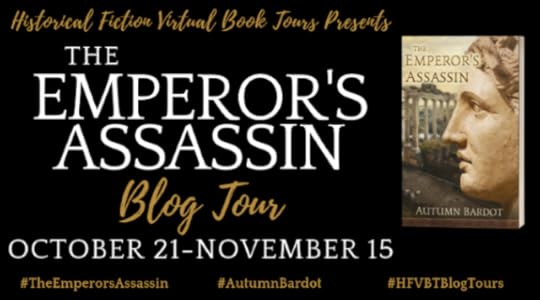
• Giveaway ends at 11:59 pm EST on November 15th. You must be 18 or older to enter.
• Paperback giveaway is open to US residents only.
• Only one entry per household.
• All giveaway entrants agree to be honest and not cheat the systems; any suspicion of fraud will be decided upon by blog/site owner and the sponsor, and entrants may be disqualified at our discretion.
• The winner has 48 hours to claim prize or a new winner is chosen.Pick up your copy ofThe Emperor’s AssassinAMAZON
Autumn Bardot
 Autumn Bardot writes historical fiction and historical erotica. Her debut historical fiction is THE IMPALER’S WIFE. Her debut historical erotica is LEGENDS OF LUST.Autumn, a pen name, has worked as an educator for more than sixteen years. She teaches literature, writing, and the magic of words. She has a passion for history and a special affinity for the unsung courageous females that history has neglected. Or misunderstood. Autumn lives in Southern California with her husband and every-growing family. She wishes she was one-tenth as brave as the women she writes about.Historical Fiction
Autumn Bardot writes historical fiction and historical erotica. Her debut historical fiction is THE IMPALER’S WIFE. Her debut historical erotica is LEGENDS OF LUST.Autumn, a pen name, has worked as an educator for more than sixteen years. She teaches literature, writing, and the magic of words. She has a passion for history and a special affinity for the unsung courageous females that history has neglected. Or misunderstood. Autumn lives in Southern California with her husband and every-growing family. She wishes she was one-tenth as brave as the women she writes about.Historical Fiction~ The Impaler’s Wife
~ Dragon Lady
~ The Emperor’s Assassin ( coming Oct 1, 2019 )Historical Erotica ( Cleis Press)
~ Legends of Lust, Erotic Myths from around the World
~ Confessions of a Sheba Queen ( coming March 10, 2020)Connect with AutumnWEBSITE • FACEBOOK • TWITTER • INSTAGRAM • PINTEREST

Published on November 07, 2019 20:00
Are you looking for a safe and legitimate way to gain interest and reviews for your Book? Let's talk about NetGalley #BookReviews #NetGalley
[image error]
If so, NetGalley may be the answer.
What is NetGalley?
In their own words:
"NetGalley is a platform that allows publishers to put their books in front of readers of influence. Over 380,000 registered members use the site to find titles to review, books to stock in their stores or libraries, add to educational reading lists or cover in their media activities. If approved to access the title, members can download it securely to any major reading device, and as all files are protected, your content cannot be shared or disseminated. It’s the perfect way to amplify the interest in your titles before, during and after publication."
I have secured a massive 25% discount with Books Go Social's, already very reasonable, NetGalley Promotional Package. This discount makes it very affordable for you to get your book onto NetGalley and in front of those 380,000 registered members.
I would not try to sell you something that I did not believe in. I have used NetGalley, and it allowed me to connect with the most wonderful book bloggers, many of whom are now part of my launch team. For me, it was certainly worth the money.
NetGalley is the #1 service in the world for getting reviews on Amazon — many of the reviewers are Amazon Top Reviewers as well as being influential bloggers.
Who are Books Go Social?

Books Go Social (BGS) is a highly respected Author Promotion service — you may have already heard of them. The founder of BGS, Laurence O’ Bryan is dedicated to helping authors showcase their books. He knows what works and what does not. This is why I am so excited to be working with him on this fantastic deal.
This offer is only available for a very LIMITED TIME. With the 25% discount, this is one of the cheapest ways you can get your book in front of those influential NetGalley Professional Readers.
To get your 25% discount click on:
Books Go Social NetGalley Promotion
and type:
may25
at the checkout.
If you have any questions, then don’t hesitate to ask.
*NetGalley does not restrict to positive only reviews.
Published on November 07, 2019 18:30
November 6, 2019
Check out Historical Romance author, Vanessa Kelly's, fabulous book — The Highlander’s Christmas Bride #Christmas #HistoricalRomance @VanessaKellyAut @hfvbt @KensingtonBooks
Historical Fiction Virtual Blog Tours Presents…
The Highlander’s Christmas BrideBy Vanessa Kelly

In bestselling author Vanessa Kelly’s irresistible Clan Kendrick series, Christmas in the Highlands means family, celebration—and for one brother, the beginning of a passionate adventure . . .
Being thrown over by the man she expected to marry was humiliating enough. Now that Donella Haddon, grandniece of the Earl of Riddick, has also proven a failure as a nun, she has no choice but to return to her family’s estate. The brawny Highlander sent to escort her is brash, handsome, and the only thing standing between Donella and a gang of would-be kidnappers. But the scandal in her past can’t be so easily outrun . . .
Wealthy widower Logan Kendrick was expecting to meet a plain, pious spinster—not a gorgeous, sharp-tongued lass who can hold her own in any ambush. Though she’s known as the Flower of Clan Graham, Donella is no shrinking violet. In fact, she might be the perfect woman to bring happiness back to his lonely little son’s life, just in time for Christmas. But first he must protect her from ugly gossip and a mysterious threat—and convince her that their wild, unexpected desire is heaven sent.
Giveaway
During the Blog Tour, we are giving away signed copies of THE HIGHLANDER’S PRINCESS BRIDE and THE HIGHLANDER WHO PROTECTED ME + a $20 Amazon gift card! You can enter the Giveaway HERE!
Giveaway Rules
• Giveaway ends at 11:59 pm EST on November 12th. You must be 18 or older to enter.
• Paperback giveaway is open internationally.
• Only one entry per household.
• All giveaway entrants agree to be honest and not cheat the systems; any suspicion of fraud will be decided upon by blog/site owner and the sponsor, and entrants may be disqualified at our discretion.
• The winner has 48 hours to claim prize or a new winner is chosen.
Pick up your copy ofThe Highlander’s Christmas BrideAMAZON • BARNES AND NOBLE • INDIEBOUND
Vanessa Kelly
 Vanessa Kelly is a USA Today Bestselling, award-winning author who was named by Booklist, the review journal of the American Library Association, as one of the “New Stars of Historical Romance.” Her Regency-set historical romances have been nominated in a number of contests, and she has won multiple awards, including the prestigious Maggie Medallion for Best Historical Romance. Her books have been published in nine languages.Vanessa’s latest book, The Highlander Who Protected Me, was a USA Today, Barnes & Noble, and BookScan bestseller. Her Renegade Royals Series was a national bestseller, as was The Improper Princesses Series. My Fair Princess was named a Goodreads Romance of the Month and is a USA Today and BookScan bestseller. The Highlander’s Princess Bride, book 3 in the series, was a Barnes and Noble top 50 bestseller.
Vanessa Kelly is a USA Today Bestselling, award-winning author who was named by Booklist, the review journal of the American Library Association, as one of the “New Stars of Historical Romance.” Her Regency-set historical romances have been nominated in a number of contests, and she has won multiple awards, including the prestigious Maggie Medallion for Best Historical Romance. Her books have been published in nine languages.Vanessa’s latest book, The Highlander Who Protected Me, was a USA Today, Barnes & Noble, and BookScan bestseller. Her Renegade Royals Series was a national bestseller, as was The Improper Princesses Series. My Fair Princess was named a Goodreads Romance of the Month and is a USA Today and BookScan bestseller. The Highlander’s Princess Bride, book 3 in the series, was a Barnes and Noble top 50 bestseller.When she’s not dreaming of plots for her next Regency novel, Vanessa is writing USA Today Bestselling books with her husband, under the pen name of V.K. Sykes.
You can find Vanessa at vanessakellyauthor.com or at vksykes.com. For all of Vanessa’s latest news and contests–and to receive a free story–please sign up for her newsletter on her website.
CLAN KENDRICK FACEBOOK GROUP • FACEBOOK AUTHOR PAGE • PINTEREST • TWITTER • GOODREADS

Published on November 06, 2019 20:00
November 5, 2019
An Author’s Inspiration: Owain Glyndŵr inspires a Regency Romance by Jayne Davis #amwriting #HistoricalFiction @jaynedavis142
An Author’s Inspiration Owain Glyndŵr inspires a Regency RomanceBy Jayne Davis
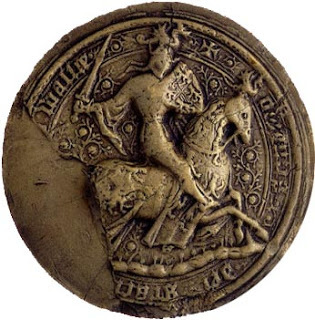 Seal of Owain Glyndŵr
Seal of Owain GlyndŵrOwain Glyndŵr was the last native-born Prince of Wales, and died some time around 1415. I write Regency Romances, so how can a Welsh freedom fighter have inspired a light-hearted romance?The man first crossed my path, in a manner of speaking, when I was studying for my English Literature O level (for non-Brits, or Brits a good deal younger than me, O levels were formal qualifications taken at the age of 16). We had to study at least one Shakespeare play, and ours was Henry IV Part 1. In that play, much is made of the rivalry between 3 men of similar age – Prince Hal (later to become Henry V), Hotspur (Sir Henry Percy) and Owen Glendower (the anglicised spelling of Glyndŵr’s name). In the play, The real man
 Corwen’s statue of Owain Glyndŵr / Ian West.
Corwen’s statue of Owain Glyndŵr / Ian West.In reality, Glyndŵr was a descendent of the Princes of Powys. He instigated a Welsh Revolt against Henry IV; there are differing explanations of the initial cause of this rebellion. Over a period of several years he gradually took control of Wales, and in 1404 he called his first parliament at Machynlleth and had himself crowned Prince of Wales. Then Prince Henry changed the English strategy from military expeditions into Wales to economic blockade, and this gradually succeeded. His last successful raid was in 1412.
 Glyndŵr’s Parliament House in Machynlleth, pictured in 1814.
Glyndŵr’s Parliament House in Machynlleth, pictured in 1814.He was never seen again by his enemies after that. He was never captured or betrayed, in spite of rewards being offered by the English. His final fate and grave are unknown, although there are various theories about how he spent his last days.
A story is born
Today, Glyndŵr is recognised as a national hero, and this is where I come back into the story. One of my hobbies is doing long distance walks with my partner and a friend. There is a 9 day walk across Wales called the Glyndŵr Way, linking some places associated with him. At one point, huddling in a wood in the cold and wet to eat a bit of lunch, we found a historical notice board explaining that a Welsh army had seen off English forces here, assisted by the weather. It seemed most appropriate.It was on that same holiday, when my thoughts were wandering as they do at such times, that I contemplated mentions of Wales in historical romances. In one of Georgette Heyer’s novels (Faro’s Daughter), a secondary character is sent off to an aunt in Wales to keep her out of the clutches of the unpleasant suitor her father has lined up for her. The implication is that the aunt is a force to be reckoned with. In other tales, heroines are threatened with being sent to their aunt in Wales as a punishment for misdeeds (refusing offers of marriage, or wanting to accept the wrong ones). Then I started to wonder, what if the aunt in Wales was not quite what anyone expected? And so a story was born. I also love the Welsh countryside, and leapt at the chance to describe some of it as part of my story. Glyndŵr gets a very short mention!
 Autumnal scenery in mid Wales.
Autumnal scenery in mid Wales.An Embroidered SpoonBy Jayne Davis

Wales 1817
After refusing every offer of marriage that comes her way, Isolde Farrington is packed off to a spinster aunt in Wales until she comes to her senses.Rhys Williams, there on business, is turning over his uncle’s choice of bride for him, and the last thing he needs is to fall for an impertinent miss like Izzy – who takes Rhys for a yokel.Izzy’s new surroundings make her look at life, and Rhys, afresh. But when her father, Lord Bedley, discovers that the situation in Wales is not what he thought, and that Rhys is in trade, a gulf opens for a pair who’ve come to love each other.Will a difference in class keep them apart?
Pick up your copy of
An Embroidered Spoon
Amazon
or read free on Kindle Unlimited.
Jayne Davis
 Jayne Davis writes historical romances set in the late Georgian/Regency era, published as both ebooks and paperbacks.She was hooked on Jane Austen and Georgette Heyer as a teenager, and longed to write similar novels herself. Real life intervened, and she had several careers, including as a non-fiction author under another name. That wasn't quite the writing career she had in mind...Finally, she got around to polishing up stories written for her own amusement in long winter evenings, and became the kind of author she’d dreamed of in her teens. She is now working on the first few books in the Marstone Series, set in the late Georgian/early Regency period, but keeps getting distracted by other story ideas.Connect with Jayne: Website • Facebook • Twitter • Pinterest • Goodreads.
Jayne Davis writes historical romances set in the late Georgian/Regency era, published as both ebooks and paperbacks.She was hooked on Jane Austen and Georgette Heyer as a teenager, and longed to write similar novels herself. Real life intervened, and she had several careers, including as a non-fiction author under another name. That wasn't quite the writing career she had in mind...Finally, she got around to polishing up stories written for her own amusement in long winter evenings, and became the kind of author she’d dreamed of in her teens. She is now working on the first few books in the Marstone Series, set in the late Georgian/early Regency period, but keeps getting distracted by other story ideas.Connect with Jayne: Website • Facebook • Twitter • Pinterest • Goodreads.
Published on November 05, 2019 19:30
November 4, 2019
#HistoricalFiction author Tony Morgan, is taking a look at Monteagle’s Letter #History #fireworksnight @MorgantheBook
Published on November 04, 2019 21:00
November 3, 2019
Check out #HistoricalFiction author, Jennifer C. Wilson's, fabulous new book — The Raided Heart: A Border Reiver Romantic Adventure (The Historic Hearts Book 1) @inkjunkie1984
The Raided Heart:A Border Reiver Romantic Adventure(The Historic Hearts Book 1)By Jennifer C. Wilson

Hi Mary Anne, and thank you so much for hosting me on your blog today, ahead of the launch of The Raided Heart, released on 15th November, but available on pre-order now, here.
First, let me tempt you in with the blurb…
Meg Mathers, the headstrong youngest sibling of a reiving family on the English-Scottish border, is determined to remain at her childhood home, caring for the land and village she’s grown up with. When an accident brings her a broken ankle and six weeks in the resentful company of ambitious and angry young reiver Will Hetherington, attraction starts to build. Both begin to realise they might have met their match, and the love of their lives, but 15th century border living is not that simple, as Meg soon finds herself betrothed to the weakling son of a tyrannical neighbour, Alexander Gray. When tragedy strikes, can Meg and Will find their way back to each other, and can Will finally take his own personal revenge on Gray?The Raided Heart is the first of "The Historic Hearts", a collection of historical romantic adventures set in Scotland and the North of England.
I know all published books are special to their authors, but for me, I would have to confess to having ‘joint favourites’! Although Kindred Spirits: Tower of London was the first book I was lucky enough to have accepted and published, The Raided Heartis the first novel I ever wrote, back when I was 13, inspired by the stunning Carnasserie Castle, not far from Oban. It’s gone through some major changes since that first draft, not least a shift in the setting from 1530s Scotland to 1470s Northumberland, and the world of the border reivers. The reivers, for those who aren’t familiar with their history, were groups of families who lived along the England-Scotland border, and infamous for their raids into enemy territory, stealing livestock, kidnapping and thieving for a living. They were a hardy bunch, but full of character (and characters), and as I was living in Northumberland when I wrote the latest draft of the book, I decided it would be great to bring the two elements together. Will and Meg haven’t changed much since their first incarnation, but the world around them certainly has. This is the first full-length novel I’ve published which doesn’t have the fall-back of ghosts of time-travel, and although I loved undertaking the research, it was certainly challenging, making sure there were no anachronisms creeping in. As well as inadvertent plagiarism! It’s fair to say that for 13 year old me, Robin Hood: Prince of Thievesand The Princess Bride were definitely strong reference points for inspiration, and during one key scene, I had to completely rewrite a sword-fight, having accidentally paraphrased perhaps one of the most famous sword-fight-based lines in cinema history… After all this time in the making, it feels slightly terrifying to be letting it out ‘into the wild’, but I know it’s time to let it spread its wings, and I hope people enjoy reading it as much as I enjoyed writing it. To tempt you in further though, here’s a snippet from the first chapter:
Long Ridge, Northumberland, October 1471
The dark still wasn’t moving. Meg Mathers stood at the window of the family’s bastle, trying to pick out any hint of movement, friend or foe, against the blue-black of the night, but there was none to be found. It had been hours since the men had ridden out – it couldn’t be much longer now. Without looking down, she polished the pewter dish in her hand once again; she didn’t know how many times she had cleaned it already that night, but she couldn’t stop. Just as she knew that behind her, Hannah Carstairs and Lizzie Wilkinson would be equally lost in equally meaningless repetition. Behind each dot of light in the cottages beyond the enclosure’s defensive wall, it would be the same. The women, the old, the young and the infirm, each finding their own way to pass the hours until fathers, husbands, brothers and sons were safely returned to them. None were aware of what they were doing; the cloth in Meg’s hand could rub away to nothing and the fact wouldn’t have registered. At least it felt productive. As much as Meg hated seeing them go on each raid, it was a necessity this time. One more failed try, and the dreaded possibility of over-winter starvation might just become their reality. Meat was already running low. She kept staring into the dark.
***
“Come on lad, we can make it!” Robert Mathers yelled at the top of his voice. Will Hetherington was uncertain whether his leader was encouraging his horse, himself, or Will. It didn’t really matter; either way, they needed to speed up. In the muddle of hooves, equine and bovine, Will was no longer sure whether the horses he could hear were just from their own gang, or if they were being pursued by their victims. Seven fat cattle were certainly a prize worth chasing after, if the farm had noticed their theft. He wanted to stop, to allow Robert to take stock, to check the hilltops which surrounded them for beacons, or the tiny dots of flaming peat cuts (the sure sign they were being pursued), to check whether they might be heading into a trap, but there was no time. Long Ridge was still miles away by his reckoning, and only then if they stayed on the right path – easier said than done in the race to safety from a raid, in the dead of night, and with just a hint of fear constantly at the back of your mind. He trusted the two brothers leading them, but mistakes could still happen. He was far too aware of that. Will blinked away the memories which threatened to return. He had to focus, this was no time to wallow.
The Coffee Pot Book Club
5 Stars
Highly Recommended

Reserve your copy today
Amazon
Jennifer C. Wilson
 Jennifer C. Wilson is a marine biologist by training, who developed an equal passion for history and historical fiction whilst stalking Mary, Queen of Scots on childhood holidays (she has since moved on to Richard III). Enrolling on an adult education workshop on her return to the north-east of England for work reignited her pastime of creative writing, and she has been filling notebooks ever since. In 2014, Jennifer won the Story Tyne short story competition, and has been working on a number of projects since, including co-hosting the North Tyneside Writers’ Circle. Her Kindred Spiritsnovels are published by Crooked Cat Books and her timeslip novella, The Last Plantagenet?, through Ocelot Press. The Raided Heart is the first in a new collection of historical romances. She lives in North Tyneside, and is very proud of her approximately 2-inch view of the North Sea. Connect with Jennifer: Website • Amazon • Facebook • Twitter • Instagram.
Jennifer C. Wilson is a marine biologist by training, who developed an equal passion for history and historical fiction whilst stalking Mary, Queen of Scots on childhood holidays (she has since moved on to Richard III). Enrolling on an adult education workshop on her return to the north-east of England for work reignited her pastime of creative writing, and she has been filling notebooks ever since. In 2014, Jennifer won the Story Tyne short story competition, and has been working on a number of projects since, including co-hosting the North Tyneside Writers’ Circle. Her Kindred Spiritsnovels are published by Crooked Cat Books and her timeslip novella, The Last Plantagenet?, through Ocelot Press. The Raided Heart is the first in a new collection of historical romances. She lives in North Tyneside, and is very proud of her approximately 2-inch view of the North Sea. Connect with Jennifer: Website • Amazon • Facebook • Twitter • Instagram.
Published on November 03, 2019 21:00
Check out #HistoricalFiction author, Michael L. Ross', fabulous book — Across the Great Divide @MichaelLRoss7 @hfvbt
Giveaway
During the Blog Tour, we are giving away a paperback copy of Across the Great Divide!Enter HERE!Giveaway Rules
• Giveaway ends at 11:59 pm EST on November 7th. You must be 18 or older to enter.
• Paperback giveaway is open internationally.
• Only one entry per household.
• All giveaway entrants agree to be honest and not cheat the systems; any suspicion of fraud will be decided upon by blog/site owner and the sponsor, and entrants may be disqualified at our discretion.
• The winner has 48 hours to claim prize or a new winner is chosen.
Pick up your copy ofAcross the Great DivideAMAZON • BARNES AND NOBLE • INDIEBOUND
Michael Ross
 Michael Ross is a lover of history and great stories. He’s a retired software engineer turned author, with three children and five grandchildren, living in Newton, Kansas with his wife of thirty-eight years. He was born in Lubbock, Texas, and still loves Texas. The main character of “Across the Great Divide”, William Dorsey Crump, is one of the founders of Lubbock and Shallowater, Texas. Michael knew Will’s granddaughter when he was a child. He has written a scholarly article on Will Crump for the Texas Historical Society, published in the Handbook of Texas Online, and has sold short stories in the past. This is his first novel and the first in the Across the Great Divide series.Michael attended Rice University as an undergraduate, and Portland State University for his graduate degree. He has degrees in computer science, software engineering, and German. In his spare time, Michael loves to go fishing, riding horses, and play with his grandchildren, who are currently all under six years old.He sees many parallels between the time of the Civil War and our divided nation of today. Sanctuary cities, immigration, arguments around the holiday table, threats of secession – all are nothing new. Sometimes, to understand the present, you have to look at the past- and reach Across the Great Divide.Connect with Michael: WEBSITE • FACEBOOK • TWITTER • GOODREADS
Michael Ross is a lover of history and great stories. He’s a retired software engineer turned author, with three children and five grandchildren, living in Newton, Kansas with his wife of thirty-eight years. He was born in Lubbock, Texas, and still loves Texas. The main character of “Across the Great Divide”, William Dorsey Crump, is one of the founders of Lubbock and Shallowater, Texas. Michael knew Will’s granddaughter when he was a child. He has written a scholarly article on Will Crump for the Texas Historical Society, published in the Handbook of Texas Online, and has sold short stories in the past. This is his first novel and the first in the Across the Great Divide series.Michael attended Rice University as an undergraduate, and Portland State University for his graduate degree. He has degrees in computer science, software engineering, and German. In his spare time, Michael loves to go fishing, riding horses, and play with his grandchildren, who are currently all under six years old.He sees many parallels between the time of the Civil War and our divided nation of today. Sanctuary cities, immigration, arguments around the holiday table, threats of secession – all are nothing new. Sometimes, to understand the present, you have to look at the past- and reach Across the Great Divide.Connect with Michael: WEBSITE • FACEBOOK • TWITTER • GOODREADS
Published on November 03, 2019 20:00
The Coffee Pot Book Club
The Coffee Pot Book Club (formally Myths, Legends, Books, and Coffee Pots) was founded in 2015. Our goal was to create a platform that would help Historical Fiction, Historical Romance and Historical
The Coffee Pot Book Club (formally Myths, Legends, Books, and Coffee Pots) was founded in 2015. Our goal was to create a platform that would help Historical Fiction, Historical Romance and Historical Fantasy authors promote their books and find that sometimes elusive audience. The Coffee Pot Book Club soon became the place for readers to meet new authors (both traditionally published and independently) and discover their fabulous books.
...more
...more
- Mary Anne Yarde's profile
- 159 followers



